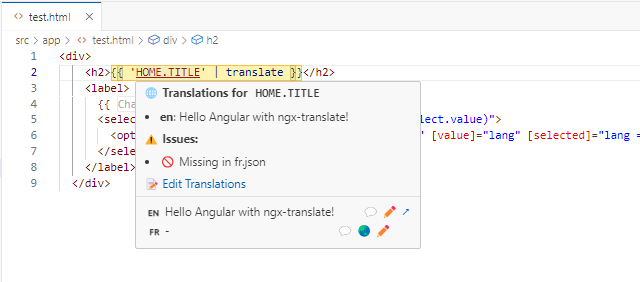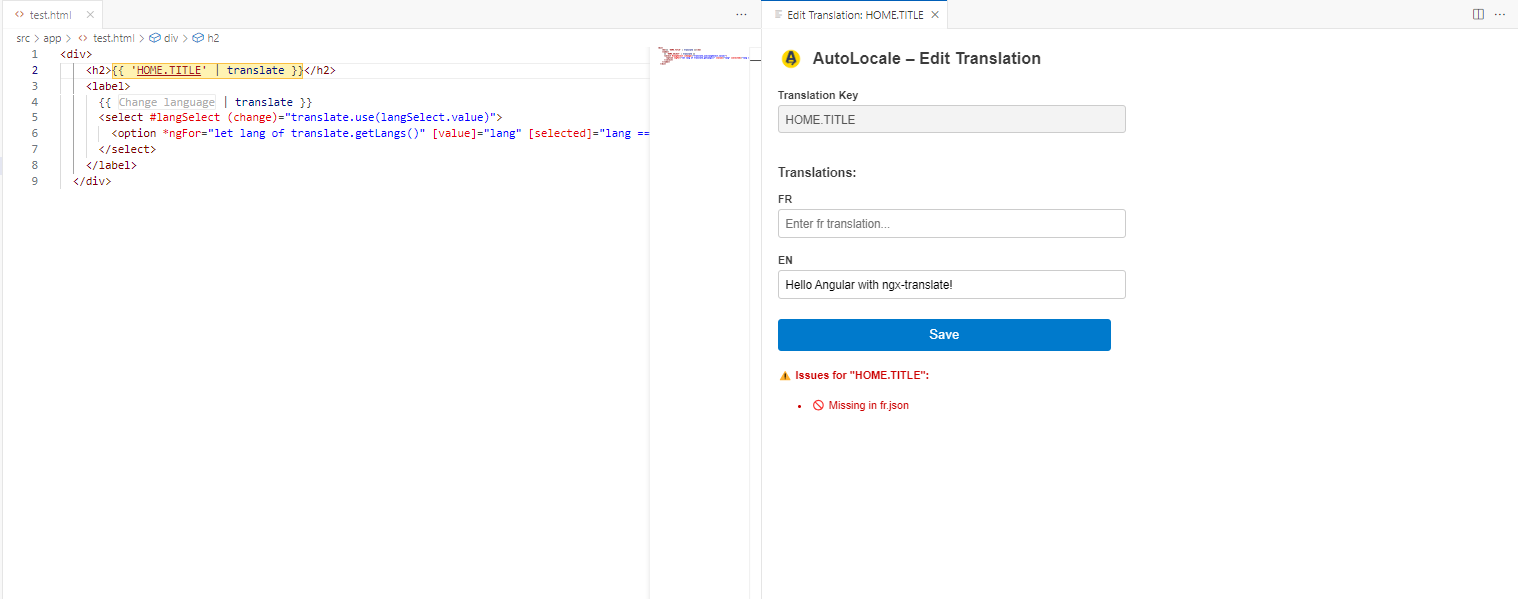AutoLocale VS Code Extension
🌐 Overview
AutoLocale is a powerful and user-friendly VS Code extension for managing localization in projects using ngx-translate or similar. It scans your codebase for translation keys, helps insert and edit them inline, and offers intuitive UIs to manage, validate, and sync translations across multiple language files.
🚀 Features
✨ Inline Translation Pipe Detection
Highlights {{ 'key' | translate }} in HTML and this.translate.transform('key') in TypeScript automatically. Other formats are configurable in the Settings.
🖱️ Cursor-Aware Popup Editor and Autocomplete
Instantly view and update translations with a smart popup when your cursor lands inside a translation pipe.


➕ Insert Translation Pipe
Insert a translate pipe with a pre-filled key at the current cursor position.
📁 Automatic Translation File Discovery
Scans your workspace for *.json files in /i18n, /locales, /lang, etc., and auto-maps language codes.
🧾 Translation Table Editor
Edit all keys and languages in a sortable, filterable table with inline editing, bulk save, import/export, and conflict highlighting.

✏️ Edit & Save Translations
Easily update translations in multiple languages using intuitive popups or the table editor.

✅ Validation & Consistency Checks
Detects:
- Missing translations across language files
- Duplicate keys
- Conflicting values
- Non-nested vs flat key inconsistencies

📤 Export Translations to CSV
Export selected or all language keys to a UTF-8 BOM-compatible CSV (Excel-friendly).
📥 Import Translations from CSV
Merge translated keys/values from a CSV file back into language JSON files.
⚙️ Custom Regex & File Path Settings
Customize how translation keys are detected per language type, and manage user-defined or ignored file paths.
🧩 Quick Command Menu
Access all features from a status bar menu or the Command Palette.

🛠️ Usage
Click the 🌐 AutoLocale button in the VS Code status bar (bottom left) to open a quick-access menu with all translation commands.
🔍 Detect & Highlight Translation Pipes
- Open any
.html or .ts file — translation pipes are automatically highlighted.
- Placing the cursor inside a pipe opens a popup translation editor.
✍️ Edit Translations
- Modify translation keys or values directly from the popup.
- All detected language files are updated accordingly.
🧾 Use the Translation Table Editor
- Run
Edit All Translations (Table View) from the Command Palette or status bar menu.
- Quickly search, filter, edit, and delete translation keys across all languages.
➕ Insert Translation Pipe
- Run
Insert Translation Pipe from the Command Palette^or by pressing cmd+alt+t.
- A new key like
new.translation.key will be inserted at the cursor.
🧭 Manage Translation Files
- JSON translation files are auto-detected by language name (
en.json, fr.json, etc.).
- You can also add custom paths or ignore certain files in the Settings panel.
✅ Validate Translations
Run Validate Translations to check for:
- 🔸 Missing keys
- 🔸 Duplicate entries
- 🔸 Key formatting issues
- 🔸 Inconsistencies across language files
Fix problems interactively using the popup validator.
📤 Export / 📥 Import
- Use
Export Translations (CSV) to save keys/values to a semicolon-delimited CSV.
- Use
Import Translations (CSV) to sync values from CSV back to JSON files.
📦 Installation
- Open Visual Studio Code.
- Go to Extensions (
Ctrl+Shift+X / Cmd+Shift+X).
- Search for AutoLocale or
Scan Translation Pipes.
- Click Install and reload VS Code.
💻 Commands
| Command |
Description |
Insert Translation Pipe |
Insert a new translate pipe at the cursor position. |
Validate Translations |
Check translation files for missing/duplicate keys. |
Export Translations (CSV) |
Save translations into a CSV file. |
Import Translations (CSV) |
Load and merge translations from a CSV file. |
Scan Translation Files |
Re-scan the workspace for translation files. |
Edit All Translations (Table View) |
Open the full table editor to manage all keys. |
Open Translation Settings |
Manage language files, regex patterns, and preferences. |
⚙️ Configuration & File Naming
Translation files should follow naming conventions such as:
en.jsonfr.jsones-ES.json
And reside in standard folders such as:
You can customize detection and override paths from the Settings panel.
📋 Requirements
- VS Code v1.60 or higher
- Angular project using
@ngx-translate/core
- JSON-based translation files
⚠️ Known Issues
- Large translation files may reduce performance during validation or table rendering.
- Dynamic translation keys (e.g., via variables or runtime strings) are not currently supported.
- Only json translation files are supported currently.
🤝 Contributing
Found a bug? Have an idea?
Open an issue or submit a pull request!
📎 GitHub Repository







